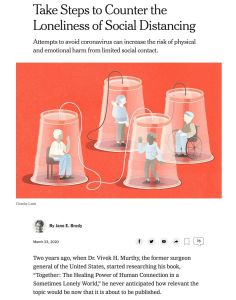Join getAbstract to access the summary!

Join getAbstract to access the summary!
Jane E. Brody
Take Steps to Counter the Loneliness of Social Distancing
Attempts to avoid coronavirus can increase the risk of physical and emotional harm from limited social contact.
The New York Times, 2020
What's inside?
Is loneliness worse for your health than smoking?
Recommendation
Research suggests that most people pick up their phones up to nine times every hour, but when did you last pick up your phone to make an actual call? New York Times personal health columnist Jane E. Brody says that now would be a great time to do just that, because when social connection breaks down, mental health plummets. During the coronavirus pandemic, people who are sheltering in place need social connection more than ever. Brody offers some useful tips to help you fight loneliness during self-isolation.
Take-Aways
- Long-term loneliness poses a hefty risk to people’s physical and emotional health.
- To mitigate the negative effects of isolation, pick up the phone and call your family and friends.
- Doing service and having a “people first” mind-set is good policy – now and when things return to normal.
Summary
Long-term loneliness poses a hefty risk to people’s physical and emotional health.
Many people are lonely sometimes. Many more people have gotten a lot lonelier since governments had to implement social distancing and self-isolation orders to reduce the spread of the deadly coronavirus. In his new book, Together: The Healing Power of Human Connection in a Sometimes Lonely World, former US surgeon general Vivek H. Murthy discusses the risks that loneliness poses to physical and emotional health.
“As Dr. [Vivek] Murthy points out, we’re wired for human connection that can counter the damaging biological effects of stress and anxiety.”
Drawing on various research, Murthy found that loneliness hurts longevity more than a sedentary lifestyle, obesity or excessive drinking. Plunging yourself into isolation decreases your lifespan by about as much as smoking 15 cigarettes a day. The National Academies of Sciences, Engineering and Medicine reports that when you’re lonely, the risk of having a stroke increases by more than a third, the risk of developing heart disease goes up by 29% and the risk of getting dementia doubles.
To mitigate the negative effects of isolation, pick up the phone and call your family and friends.
Shelter-in-place guidelines may lead to physical solitude, but solitude isn’t the same as loneliness. As Murthy says, “loneliness is the subjective feeling that you’re lacking the social connections you need – the feeling of closeness, trust and affection of genuine friends, loved ones and community.”
“Critically important is maintaining soul-restoring human connections.”
To help you alleviate loneliness while following social-distancing guidelines, make efforts to cultivate and maintain trust, closeness and affection through digital means. Don’t rely on email and text messages, which deny you the benefit of hearing the other person’s voice. University of California sociologist Stacy Torres advises people to opt for richer means of communication like calling family and friends on the phone or video conferencing with them. While you talk, avoid multitasking. Give the person on the other end of the line your full attention.
Doing service and having a “people first” mind-set is good policy – now and when things return to normal.
The pandemic has revealed a lot of good in society. Young people are picking up medications, groceries, and other items for elderly neighbors who belong to the high-risk group. Relationship expert Michele Weiner-Davis says that serving others and “adopting the Buddhist perspective of focusing on the here and now” can go a long way toward reducing anxiety levels.
“Relationships are what make our lives worth living.” (former US surgeon general Vivek H. Murthy)
Resilient communities are people-centered. If lasting change comes as a result of this pandemic, let it be a societal focus on meaningful human connection.
About the Author
Jane E. Brody has written columns about personal health for The New York Times since 1976. She’s the author of Jane Brody’s Nutrition Book and Jane Brody’s Good Food Book.
This document is restricted to personal use only.



















Comment on this summary